Reflecting on Mental Health: HSW1110 Assignment and Personal Growth
VerifiedAdded on 2022/10/31
|9
|2478
|400
Journal and Reflective Writing
AI Summary
This assignment is a reflective piece focusing on the student's personal values, attitudes, and beliefs related to mental health. The student explores the definition of mental health, the impact of social stigma, and the role of social media in mental health awareness and support. The reflection delves into the challenges faced by nurses in psychiatric care, including the variety of patients and the need for patience and understanding. The student also discusses how their views on mental health have evolved, particularly regarding cultural and ethnic considerations. The assignment concludes by emphasizing the importance of understanding cultural backgrounds, reducing stigma, and adopting a holistic approach to mental healthcare, including empathy and special observation in serious cases. The student also outlines future plans for treatment and professional development.
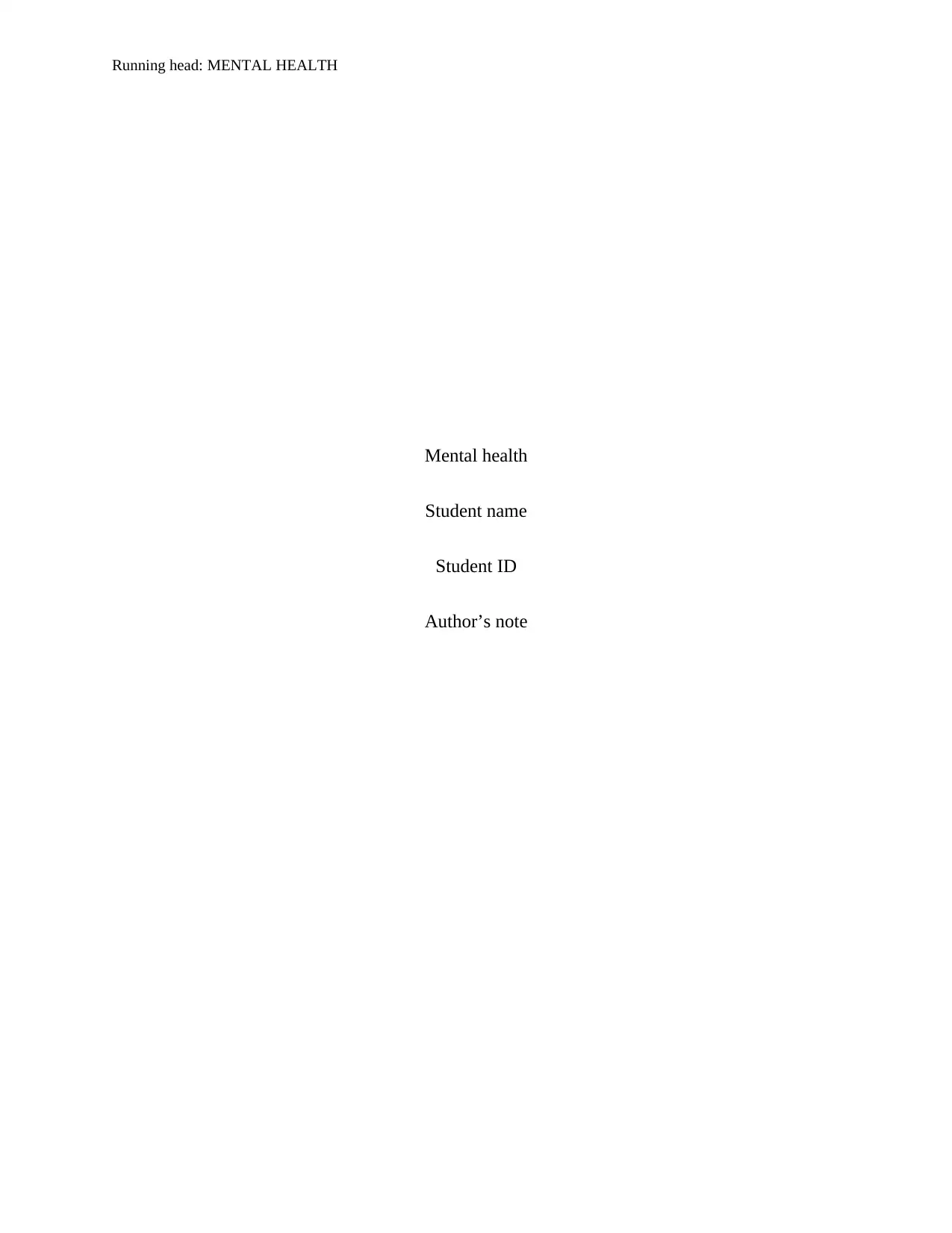
Running head: MENTAL HEALTH
Mental health
Student name
Student ID
Author’s note
Mental health
Student name
Student ID
Author’s note
Paraphrase This Document
Need a fresh take? Get an instant paraphrase of this document with our AI Paraphraser
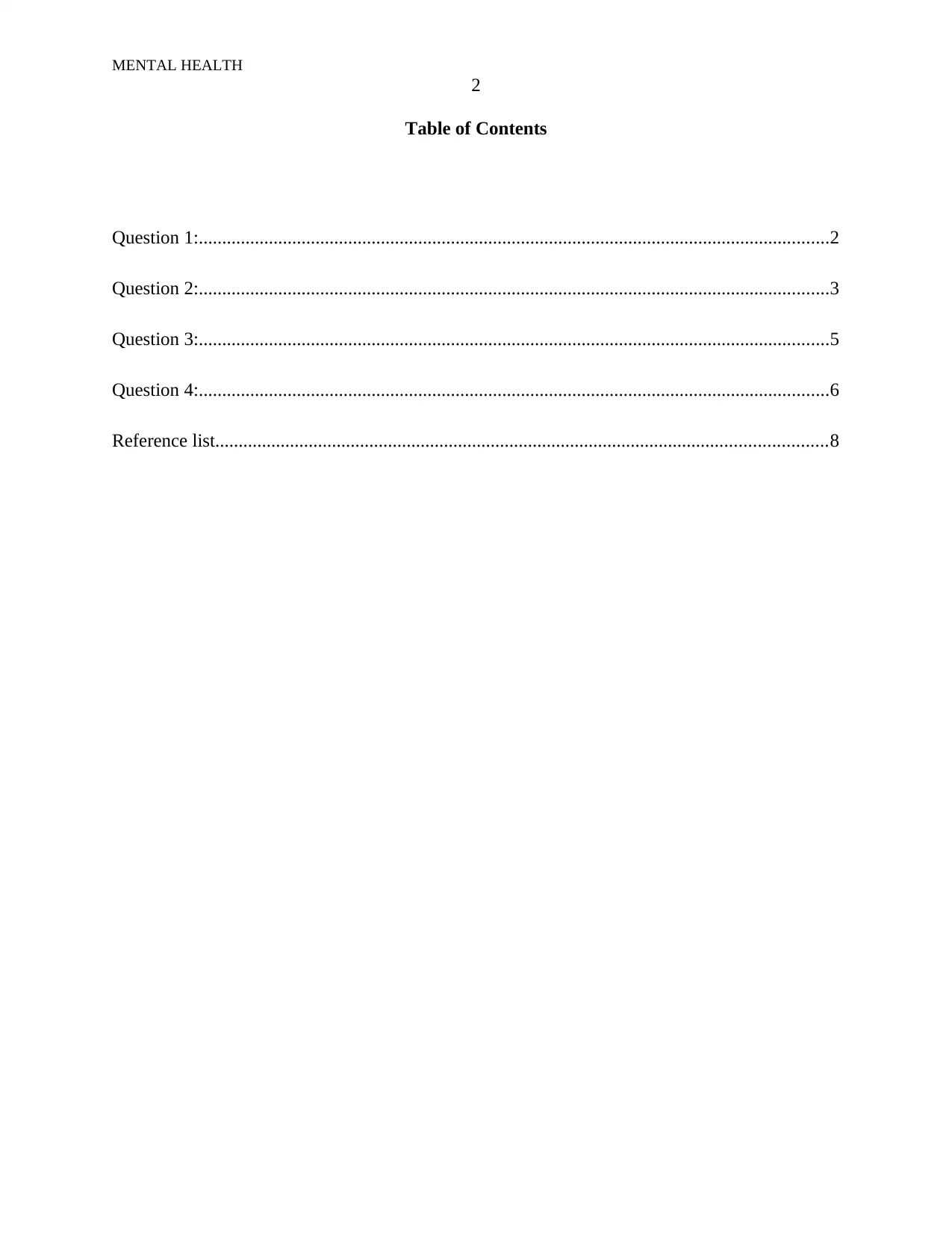
MENTAL HEALTH
2
Table of Contents
Question 1:.......................................................................................................................................2
Question 2:.......................................................................................................................................3
Question 3:.......................................................................................................................................5
Question 4:.......................................................................................................................................6
Reference list...................................................................................................................................8
2
Table of Contents
Question 1:.......................................................................................................................................2
Question 2:.......................................................................................................................................3
Question 3:.......................................................................................................................................5
Question 4:.......................................................................................................................................6
Reference list...................................................................................................................................8
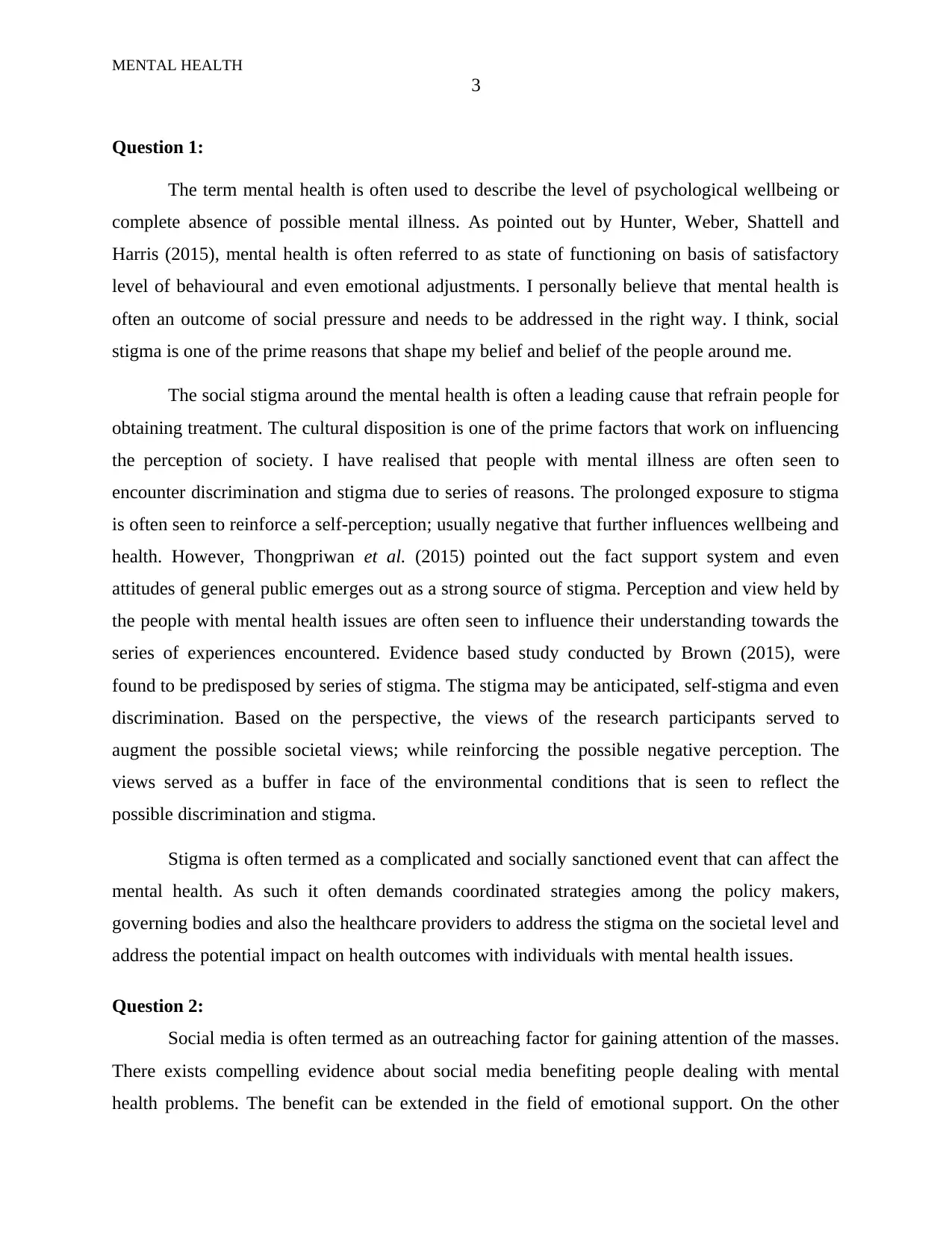
MENTAL HEALTH
3
Question 1:
The term mental health is often used to describe the level of psychological wellbeing or
complete absence of possible mental illness. As pointed out by Hunter, Weber, Shattell and
Harris (2015), mental health is often referred to as state of functioning on basis of satisfactory
level of behavioural and even emotional adjustments. I personally believe that mental health is
often an outcome of social pressure and needs to be addressed in the right way. I think, social
stigma is one of the prime reasons that shape my belief and belief of the people around me.
The social stigma around the mental health is often a leading cause that refrain people for
obtaining treatment. The cultural disposition is one of the prime factors that work on influencing
the perception of society. I have realised that people with mental illness are often seen to
encounter discrimination and stigma due to series of reasons. The prolonged exposure to stigma
is often seen to reinforce a self-perception; usually negative that further influences wellbeing and
health. However, Thongpriwan et al. (2015) pointed out the fact support system and even
attitudes of general public emerges out as a strong source of stigma. Perception and view held by
the people with mental health issues are often seen to influence their understanding towards the
series of experiences encountered. Evidence based study conducted by Brown (2015), were
found to be predisposed by series of stigma. The stigma may be anticipated, self-stigma and even
discrimination. Based on the perspective, the views of the research participants served to
augment the possible societal views; while reinforcing the possible negative perception. The
views served as a buffer in face of the environmental conditions that is seen to reflect the
possible discrimination and stigma.
Stigma is often termed as a complicated and socially sanctioned event that can affect the
mental health. As such it often demands coordinated strategies among the policy makers,
governing bodies and also the healthcare providers to address the stigma on the societal level and
address the potential impact on health outcomes with individuals with mental health issues.
Question 2:
Social media is often termed as an outreaching factor for gaining attention of the masses.
There exists compelling evidence about social media benefiting people dealing with mental
health problems. The benefit can be extended in the field of emotional support. On the other
3
Question 1:
The term mental health is often used to describe the level of psychological wellbeing or
complete absence of possible mental illness. As pointed out by Hunter, Weber, Shattell and
Harris (2015), mental health is often referred to as state of functioning on basis of satisfactory
level of behavioural and even emotional adjustments. I personally believe that mental health is
often an outcome of social pressure and needs to be addressed in the right way. I think, social
stigma is one of the prime reasons that shape my belief and belief of the people around me.
The social stigma around the mental health is often a leading cause that refrain people for
obtaining treatment. The cultural disposition is one of the prime factors that work on influencing
the perception of society. I have realised that people with mental illness are often seen to
encounter discrimination and stigma due to series of reasons. The prolonged exposure to stigma
is often seen to reinforce a self-perception; usually negative that further influences wellbeing and
health. However, Thongpriwan et al. (2015) pointed out the fact support system and even
attitudes of general public emerges out as a strong source of stigma. Perception and view held by
the people with mental health issues are often seen to influence their understanding towards the
series of experiences encountered. Evidence based study conducted by Brown (2015), were
found to be predisposed by series of stigma. The stigma may be anticipated, self-stigma and even
discrimination. Based on the perspective, the views of the research participants served to
augment the possible societal views; while reinforcing the possible negative perception. The
views served as a buffer in face of the environmental conditions that is seen to reflect the
possible discrimination and stigma.
Stigma is often termed as a complicated and socially sanctioned event that can affect the
mental health. As such it often demands coordinated strategies among the policy makers,
governing bodies and also the healthcare providers to address the stigma on the societal level and
address the potential impact on health outcomes with individuals with mental health issues.
Question 2:
Social media is often termed as an outreaching factor for gaining attention of the masses.
There exists compelling evidence about social media benefiting people dealing with mental
health problems. The benefit can be extended in the field of emotional support. On the other
⊘ This is a preview!⊘
Do you want full access?
Subscribe today to unlock all pages.

Trusted by 1+ million students worldwide
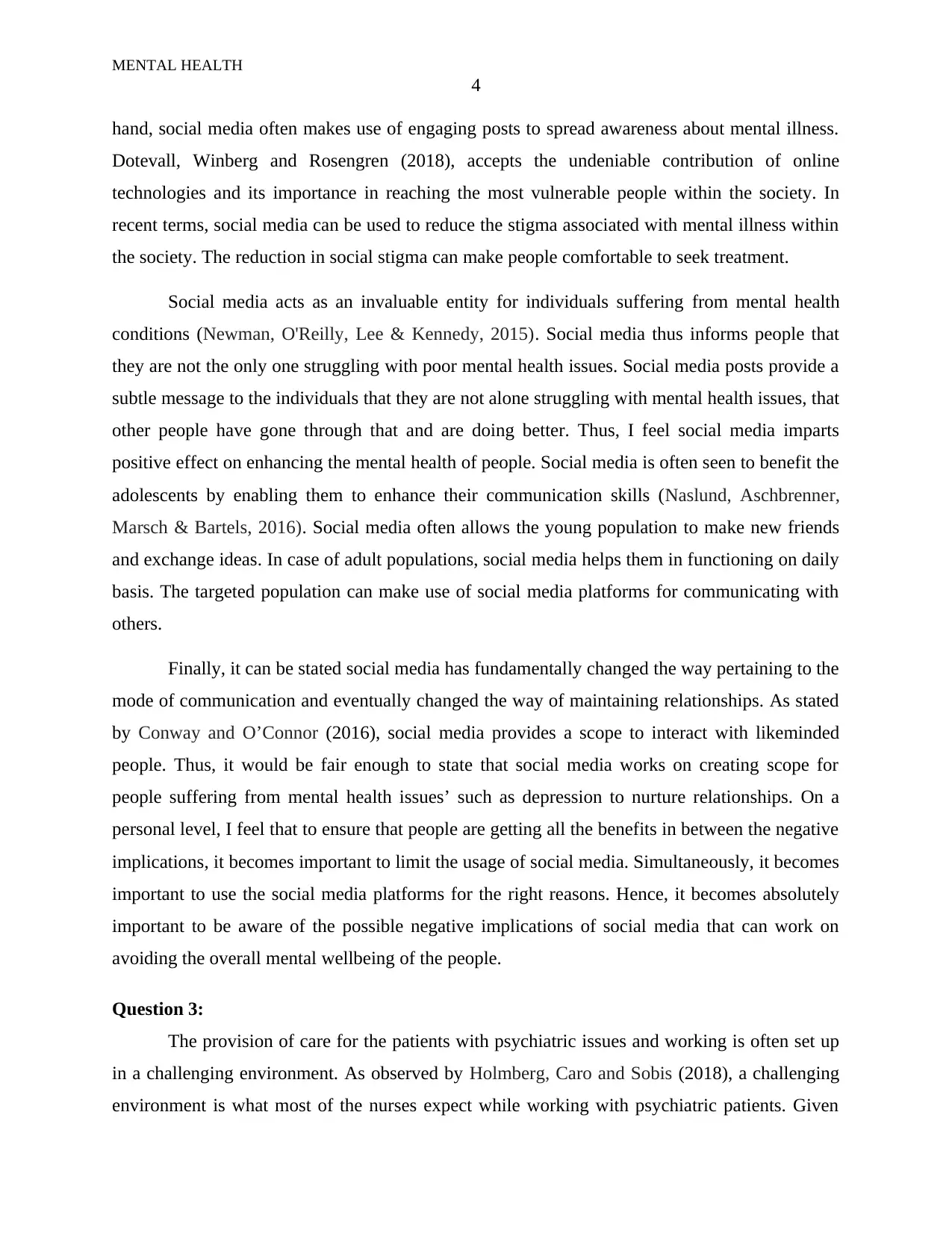
MENTAL HEALTH
4
hand, social media often makes use of engaging posts to spread awareness about mental illness.
Dotevall, Winberg and Rosengren (2018), accepts the undeniable contribution of online
technologies and its importance in reaching the most vulnerable people within the society. In
recent terms, social media can be used to reduce the stigma associated with mental illness within
the society. The reduction in social stigma can make people comfortable to seek treatment.
Social media acts as an invaluable entity for individuals suffering from mental health
conditions (Newman, O'Reilly, Lee & Kennedy, 2015). Social media thus informs people that
they are not the only one struggling with poor mental health issues. Social media posts provide a
subtle message to the individuals that they are not alone struggling with mental health issues, that
other people have gone through that and are doing better. Thus, I feel social media imparts
positive effect on enhancing the mental health of people. Social media is often seen to benefit the
adolescents by enabling them to enhance their communication skills (Naslund, Aschbrenner,
Marsch & Bartels, 2016). Social media often allows the young population to make new friends
and exchange ideas. In case of adult populations, social media helps them in functioning on daily
basis. The targeted population can make use of social media platforms for communicating with
others.
Finally, it can be stated social media has fundamentally changed the way pertaining to the
mode of communication and eventually changed the way of maintaining relationships. As stated
by Conway and O’Connor (2016), social media provides a scope to interact with likeminded
people. Thus, it would be fair enough to state that social media works on creating scope for
people suffering from mental health issues’ such as depression to nurture relationships. On a
personal level, I feel that to ensure that people are getting all the benefits in between the negative
implications, it becomes important to limit the usage of social media. Simultaneously, it becomes
important to use the social media platforms for the right reasons. Hence, it becomes absolutely
important to be aware of the possible negative implications of social media that can work on
avoiding the overall mental wellbeing of the people.
Question 3:
The provision of care for the patients with psychiatric issues and working is often set up
in a challenging environment. As observed by Holmberg, Caro and Sobis (2018), a challenging
environment is what most of the nurses expect while working with psychiatric patients. Given
4
hand, social media often makes use of engaging posts to spread awareness about mental illness.
Dotevall, Winberg and Rosengren (2018), accepts the undeniable contribution of online
technologies and its importance in reaching the most vulnerable people within the society. In
recent terms, social media can be used to reduce the stigma associated with mental illness within
the society. The reduction in social stigma can make people comfortable to seek treatment.
Social media acts as an invaluable entity for individuals suffering from mental health
conditions (Newman, O'Reilly, Lee & Kennedy, 2015). Social media thus informs people that
they are not the only one struggling with poor mental health issues. Social media posts provide a
subtle message to the individuals that they are not alone struggling with mental health issues, that
other people have gone through that and are doing better. Thus, I feel social media imparts
positive effect on enhancing the mental health of people. Social media is often seen to benefit the
adolescents by enabling them to enhance their communication skills (Naslund, Aschbrenner,
Marsch & Bartels, 2016). Social media often allows the young population to make new friends
and exchange ideas. In case of adult populations, social media helps them in functioning on daily
basis. The targeted population can make use of social media platforms for communicating with
others.
Finally, it can be stated social media has fundamentally changed the way pertaining to the
mode of communication and eventually changed the way of maintaining relationships. As stated
by Conway and O’Connor (2016), social media provides a scope to interact with likeminded
people. Thus, it would be fair enough to state that social media works on creating scope for
people suffering from mental health issues’ such as depression to nurture relationships. On a
personal level, I feel that to ensure that people are getting all the benefits in between the negative
implications, it becomes important to limit the usage of social media. Simultaneously, it becomes
important to use the social media platforms for the right reasons. Hence, it becomes absolutely
important to be aware of the possible negative implications of social media that can work on
avoiding the overall mental wellbeing of the people.
Question 3:
The provision of care for the patients with psychiatric issues and working is often set up
in a challenging environment. As observed by Holmberg, Caro and Sobis (2018), a challenging
environment is what most of the nurses expect while working with psychiatric patients. Given
Paraphrase This Document
Need a fresh take? Get an instant paraphrase of this document with our AI Paraphraser
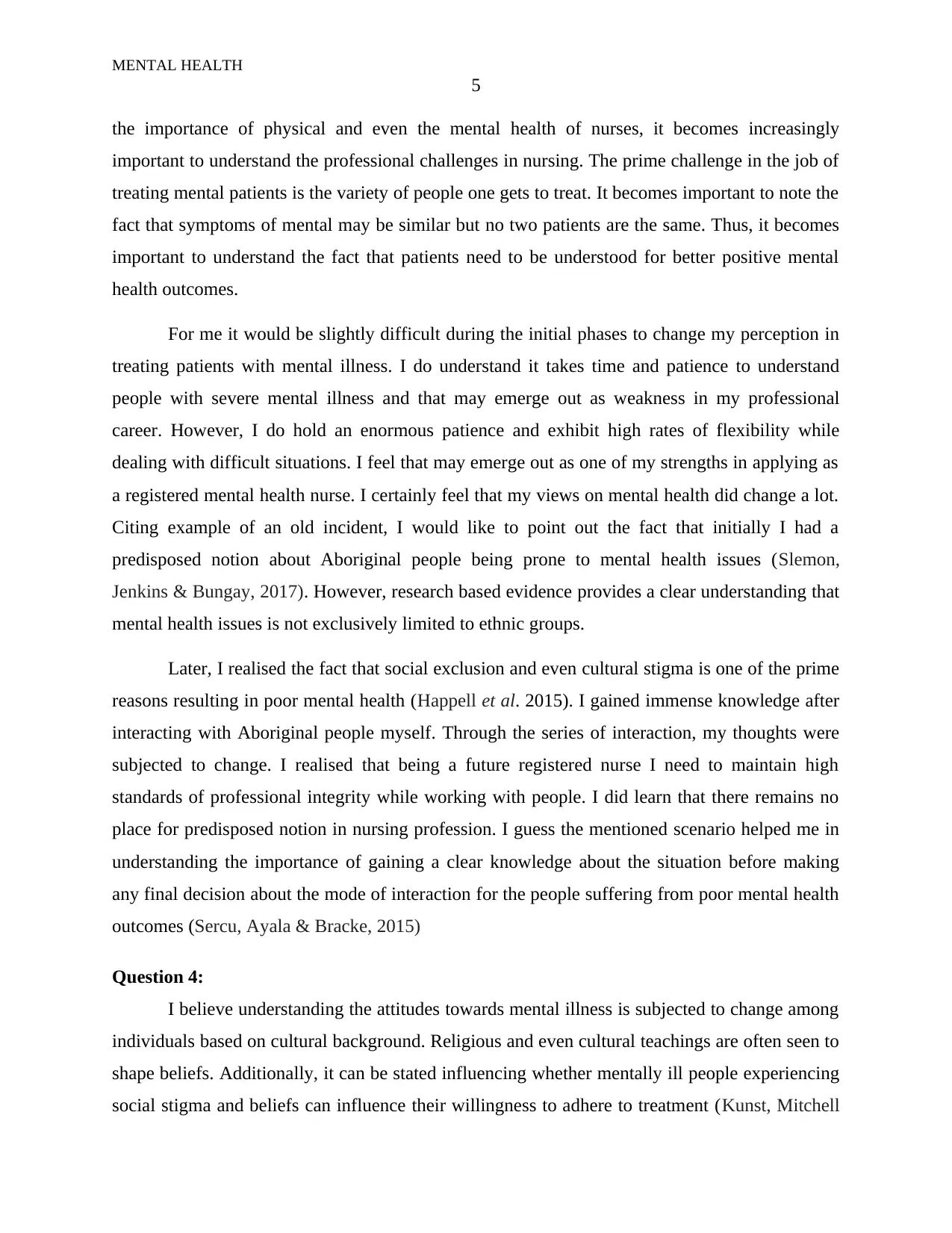
MENTAL HEALTH
5
the importance of physical and even the mental health of nurses, it becomes increasingly
important to understand the professional challenges in nursing. The prime challenge in the job of
treating mental patients is the variety of people one gets to treat. It becomes important to note the
fact that symptoms of mental may be similar but no two patients are the same. Thus, it becomes
important to understand the fact that patients need to be understood for better positive mental
health outcomes.
For me it would be slightly difficult during the initial phases to change my perception in
treating patients with mental illness. I do understand it takes time and patience to understand
people with severe mental illness and that may emerge out as weakness in my professional
career. However, I do hold an enormous patience and exhibit high rates of flexibility while
dealing with difficult situations. I feel that may emerge out as one of my strengths in applying as
a registered mental health nurse. I certainly feel that my views on mental health did change a lot.
Citing example of an old incident, I would like to point out the fact that initially I had a
predisposed notion about Aboriginal people being prone to mental health issues (Slemon,
Jenkins & Bungay, 2017). However, research based evidence provides a clear understanding that
mental health issues is not exclusively limited to ethnic groups.
Later, I realised the fact that social exclusion and even cultural stigma is one of the prime
reasons resulting in poor mental health (Happell et al. 2015). I gained immense knowledge after
interacting with Aboriginal people myself. Through the series of interaction, my thoughts were
subjected to change. I realised that being a future registered nurse I need to maintain high
standards of professional integrity while working with people. I did learn that there remains no
place for predisposed notion in nursing profession. I guess the mentioned scenario helped me in
understanding the importance of gaining a clear knowledge about the situation before making
any final decision about the mode of interaction for the people suffering from poor mental health
outcomes (Sercu, Ayala & Bracke, 2015)
Question 4:
I believe understanding the attitudes towards mental illness is subjected to change among
individuals based on cultural background. Religious and even cultural teachings are often seen to
shape beliefs. Additionally, it can be stated influencing whether mentally ill people experiencing
social stigma and beliefs can influence their willingness to adhere to treatment (Kunst, Mitchell
5
the importance of physical and even the mental health of nurses, it becomes increasingly
important to understand the professional challenges in nursing. The prime challenge in the job of
treating mental patients is the variety of people one gets to treat. It becomes important to note the
fact that symptoms of mental may be similar but no two patients are the same. Thus, it becomes
important to understand the fact that patients need to be understood for better positive mental
health outcomes.
For me it would be slightly difficult during the initial phases to change my perception in
treating patients with mental illness. I do understand it takes time and patience to understand
people with severe mental illness and that may emerge out as weakness in my professional
career. However, I do hold an enormous patience and exhibit high rates of flexibility while
dealing with difficult situations. I feel that may emerge out as one of my strengths in applying as
a registered mental health nurse. I certainly feel that my views on mental health did change a lot.
Citing example of an old incident, I would like to point out the fact that initially I had a
predisposed notion about Aboriginal people being prone to mental health issues (Slemon,
Jenkins & Bungay, 2017). However, research based evidence provides a clear understanding that
mental health issues is not exclusively limited to ethnic groups.
Later, I realised the fact that social exclusion and even cultural stigma is one of the prime
reasons resulting in poor mental health (Happell et al. 2015). I gained immense knowledge after
interacting with Aboriginal people myself. Through the series of interaction, my thoughts were
subjected to change. I realised that being a future registered nurse I need to maintain high
standards of professional integrity while working with people. I did learn that there remains no
place for predisposed notion in nursing profession. I guess the mentioned scenario helped me in
understanding the importance of gaining a clear knowledge about the situation before making
any final decision about the mode of interaction for the people suffering from poor mental health
outcomes (Sercu, Ayala & Bracke, 2015)
Question 4:
I believe understanding the attitudes towards mental illness is subjected to change among
individuals based on cultural background. Religious and even cultural teachings are often seen to
shape beliefs. Additionally, it can be stated influencing whether mentally ill people experiencing
social stigma and beliefs can influence their willingness to adhere to treatment (Kunst, Mitchell
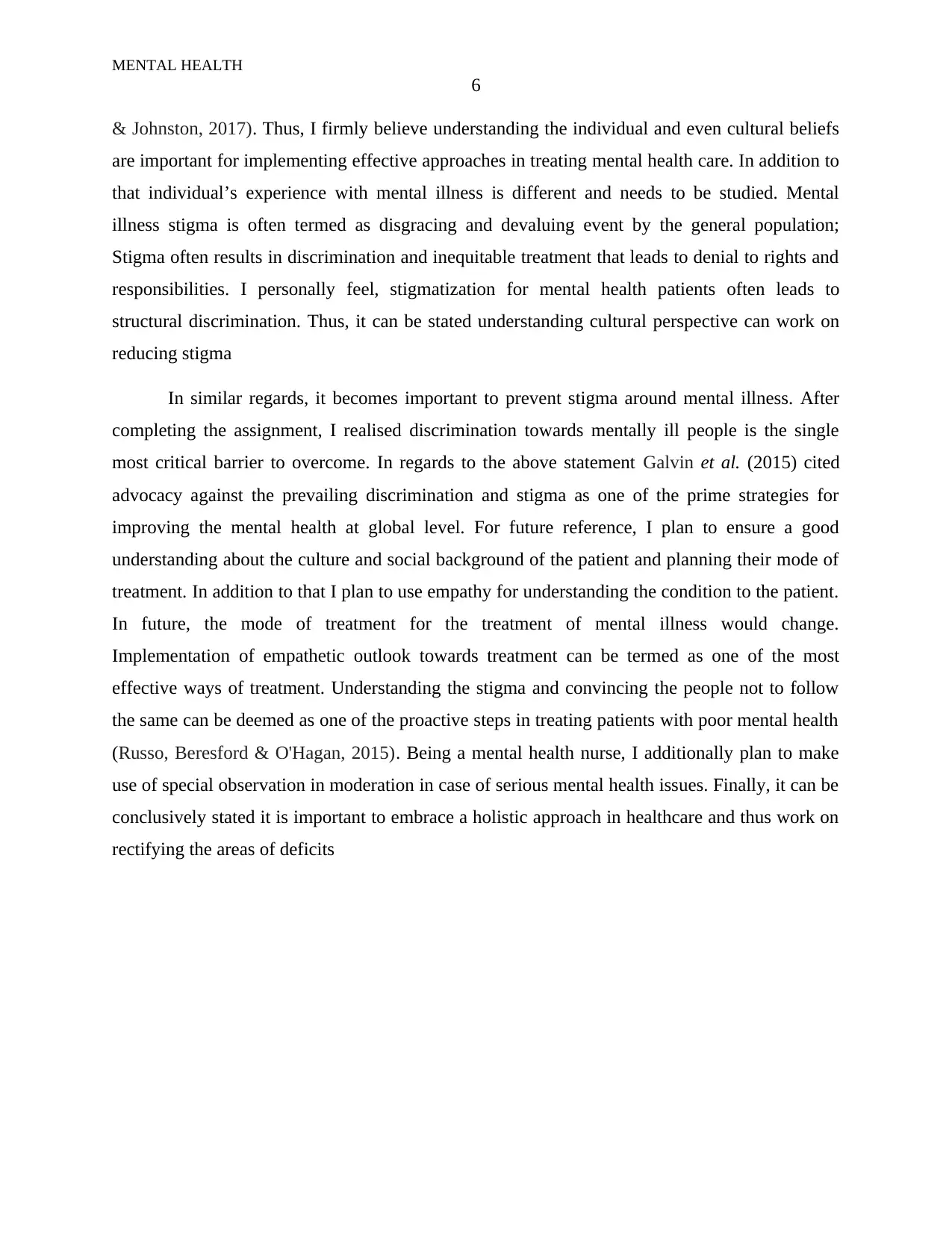
MENTAL HEALTH
6
& Johnston, 2017). Thus, I firmly believe understanding the individual and even cultural beliefs
are important for implementing effective approaches in treating mental health care. In addition to
that individual’s experience with mental illness is different and needs to be studied. Mental
illness stigma is often termed as disgracing and devaluing event by the general population;
Stigma often results in discrimination and inequitable treatment that leads to denial to rights and
responsibilities. I personally feel, stigmatization for mental health patients often leads to
structural discrimination. Thus, it can be stated understanding cultural perspective can work on
reducing stigma
In similar regards, it becomes important to prevent stigma around mental illness. After
completing the assignment, I realised discrimination towards mentally ill people is the single
most critical barrier to overcome. In regards to the above statement Galvin et al. (2015) cited
advocacy against the prevailing discrimination and stigma as one of the prime strategies for
improving the mental health at global level. For future reference, I plan to ensure a good
understanding about the culture and social background of the patient and planning their mode of
treatment. In addition to that I plan to use empathy for understanding the condition to the patient.
In future, the mode of treatment for the treatment of mental illness would change.
Implementation of empathetic outlook towards treatment can be termed as one of the most
effective ways of treatment. Understanding the stigma and convincing the people not to follow
the same can be deemed as one of the proactive steps in treating patients with poor mental health
(Russo, Beresford & O'Hagan, 2015). Being a mental health nurse, I additionally plan to make
use of special observation in moderation in case of serious mental health issues. Finally, it can be
conclusively stated it is important to embrace a holistic approach in healthcare and thus work on
rectifying the areas of deficits
6
& Johnston, 2017). Thus, I firmly believe understanding the individual and even cultural beliefs
are important for implementing effective approaches in treating mental health care. In addition to
that individual’s experience with mental illness is different and needs to be studied. Mental
illness stigma is often termed as disgracing and devaluing event by the general population;
Stigma often results in discrimination and inequitable treatment that leads to denial to rights and
responsibilities. I personally feel, stigmatization for mental health patients often leads to
structural discrimination. Thus, it can be stated understanding cultural perspective can work on
reducing stigma
In similar regards, it becomes important to prevent stigma around mental illness. After
completing the assignment, I realised discrimination towards mentally ill people is the single
most critical barrier to overcome. In regards to the above statement Galvin et al. (2015) cited
advocacy against the prevailing discrimination and stigma as one of the prime strategies for
improving the mental health at global level. For future reference, I plan to ensure a good
understanding about the culture and social background of the patient and planning their mode of
treatment. In addition to that I plan to use empathy for understanding the condition to the patient.
In future, the mode of treatment for the treatment of mental illness would change.
Implementation of empathetic outlook towards treatment can be termed as one of the most
effective ways of treatment. Understanding the stigma and convincing the people not to follow
the same can be deemed as one of the proactive steps in treating patients with poor mental health
(Russo, Beresford & O'Hagan, 2015). Being a mental health nurse, I additionally plan to make
use of special observation in moderation in case of serious mental health issues. Finally, it can be
conclusively stated it is important to embrace a holistic approach in healthcare and thus work on
rectifying the areas of deficits
⊘ This is a preview!⊘
Do you want full access?
Subscribe today to unlock all pages.

Trusted by 1+ million students worldwide
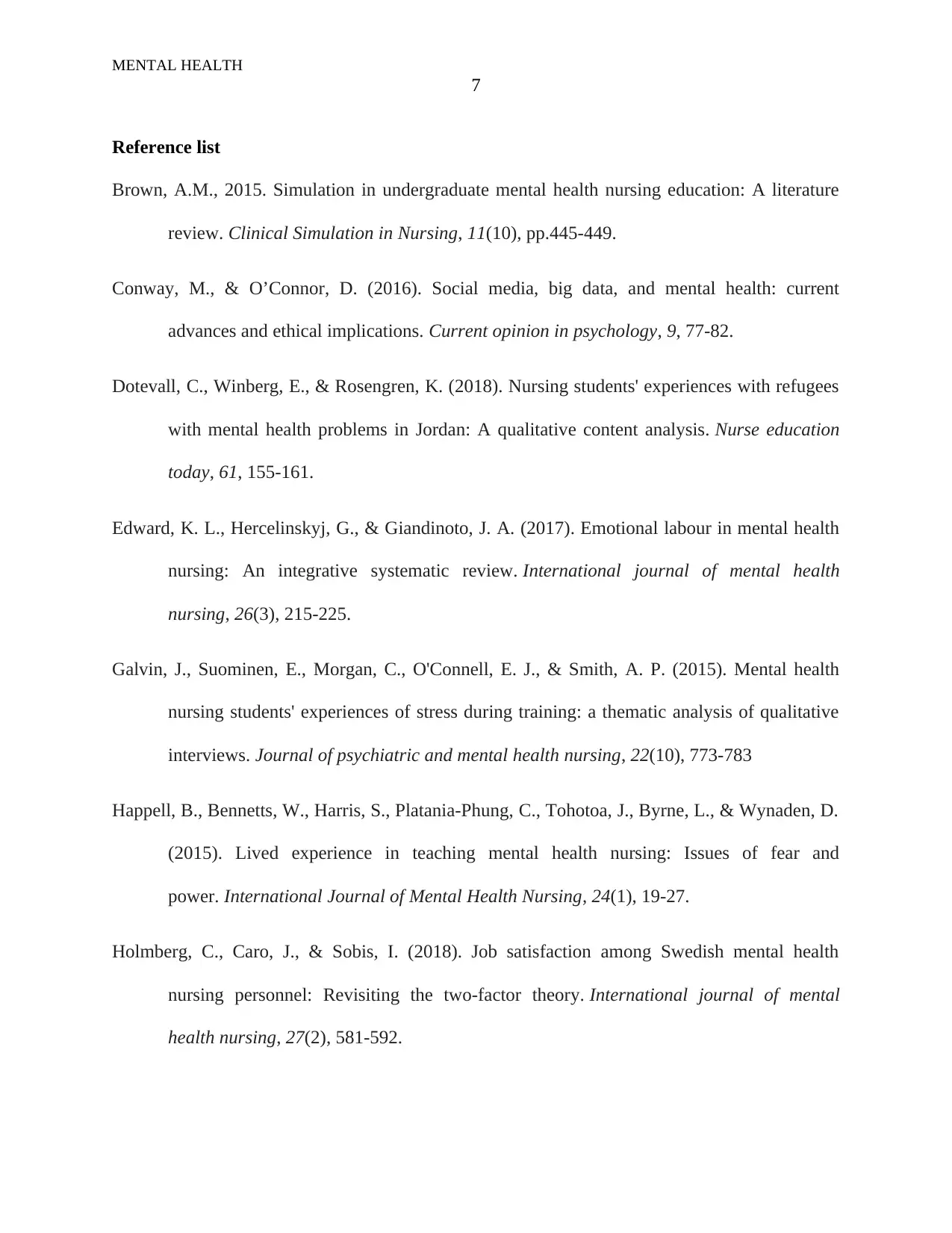
MENTAL HEALTH
7
Reference list
Brown, A.M., 2015. Simulation in undergraduate mental health nursing education: A literature
review. Clinical Simulation in Nursing, 11(10), pp.445-449.
Conway, M., & O’Connor, D. (2016). Social media, big data, and mental health: current
advances and ethical implications. Current opinion in psychology, 9, 77-82.
Dotevall, C., Winberg, E., & Rosengren, K. (2018). Nursing students' experiences with refugees
with mental health problems in Jordan: A qualitative content analysis. Nurse education
today, 61, 155-161.
Edward, K. L., Hercelinskyj, G., & Giandinoto, J. A. (2017). Emotional labour in mental health
nursing: An integrative systematic review. International journal of mental health
nursing, 26(3), 215-225.
Galvin, J., Suominen, E., Morgan, C., O'Connell, E. J., & Smith, A. P. (2015). Mental health
nursing students' experiences of stress during training: a thematic analysis of qualitative
interviews. Journal of psychiatric and mental health nursing, 22(10), 773-783
Happell, B., Bennetts, W., Harris, S., Platania‐Phung, C., Tohotoa, J., Byrne, L., & Wynaden, D.
(2015). Lived experience in teaching mental health nursing: Issues of fear and
power. International Journal of Mental Health Nursing, 24(1), 19-27.
Holmberg, C., Caro, J., & Sobis, I. (2018). Job satisfaction among Swedish mental health
nursing personnel: Revisiting the two‐factor theory. International journal of mental
health nursing, 27(2), 581-592.
7
Reference list
Brown, A.M., 2015. Simulation in undergraduate mental health nursing education: A literature
review. Clinical Simulation in Nursing, 11(10), pp.445-449.
Conway, M., & O’Connor, D. (2016). Social media, big data, and mental health: current
advances and ethical implications. Current opinion in psychology, 9, 77-82.
Dotevall, C., Winberg, E., & Rosengren, K. (2018). Nursing students' experiences with refugees
with mental health problems in Jordan: A qualitative content analysis. Nurse education
today, 61, 155-161.
Edward, K. L., Hercelinskyj, G., & Giandinoto, J. A. (2017). Emotional labour in mental health
nursing: An integrative systematic review. International journal of mental health
nursing, 26(3), 215-225.
Galvin, J., Suominen, E., Morgan, C., O'Connell, E. J., & Smith, A. P. (2015). Mental health
nursing students' experiences of stress during training: a thematic analysis of qualitative
interviews. Journal of psychiatric and mental health nursing, 22(10), 773-783
Happell, B., Bennetts, W., Harris, S., Platania‐Phung, C., Tohotoa, J., Byrne, L., & Wynaden, D.
(2015). Lived experience in teaching mental health nursing: Issues of fear and
power. International Journal of Mental Health Nursing, 24(1), 19-27.
Holmberg, C., Caro, J., & Sobis, I. (2018). Job satisfaction among Swedish mental health
nursing personnel: Revisiting the two‐factor theory. International journal of mental
health nursing, 27(2), 581-592.
Paraphrase This Document
Need a fresh take? Get an instant paraphrase of this document with our AI Paraphraser
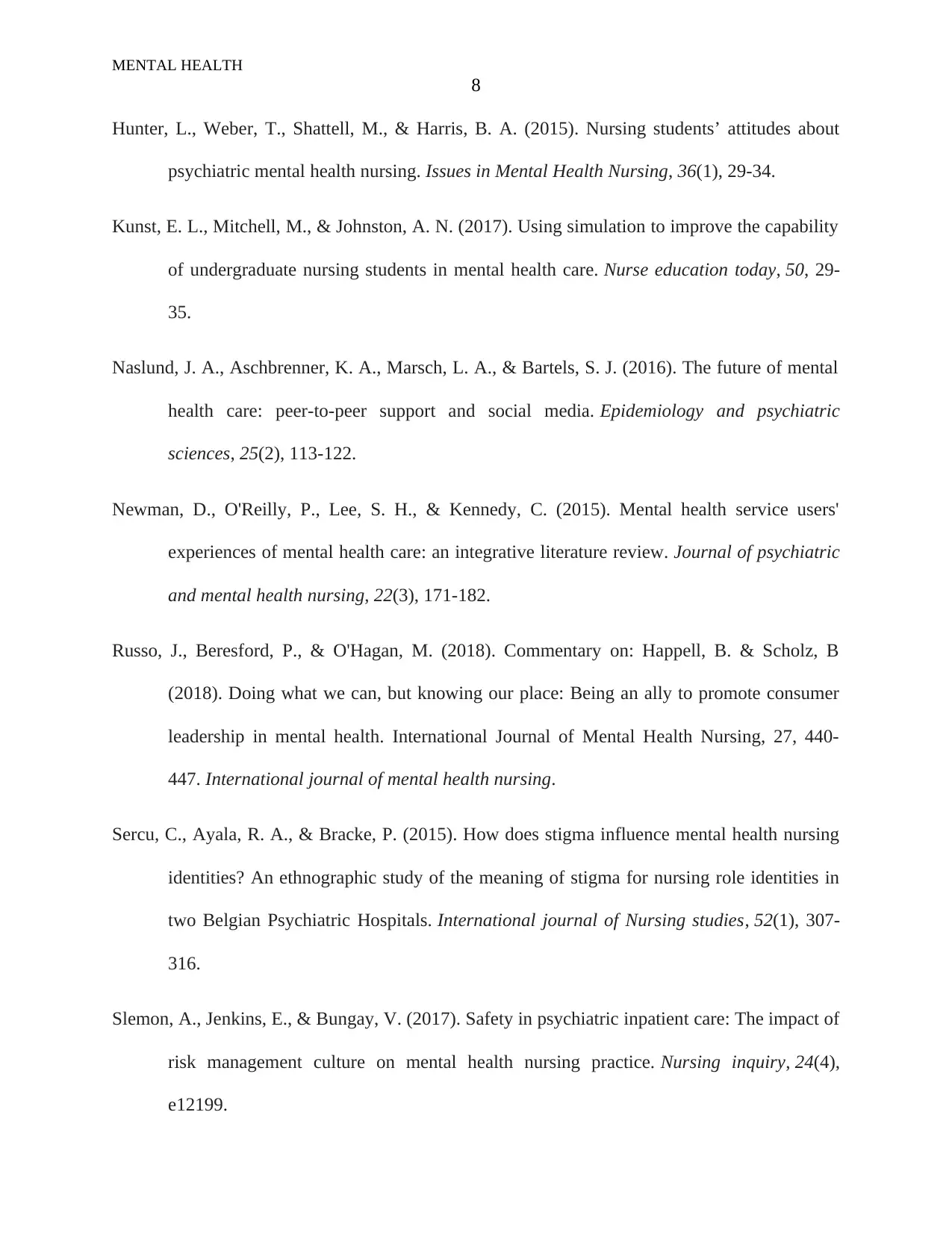
MENTAL HEALTH
8
Hunter, L., Weber, T., Shattell, M., & Harris, B. A. (2015). Nursing students’ attitudes about
psychiatric mental health nursing. Issues in Mental Health Nursing, 36(1), 29-34.
Kunst, E. L., Mitchell, M., & Johnston, A. N. (2017). Using simulation to improve the capability
of undergraduate nursing students in mental health care. Nurse education today, 50, 29-
35.
Naslund, J. A., Aschbrenner, K. A., Marsch, L. A., & Bartels, S. J. (2016). The future of mental
health care: peer-to-peer support and social media. Epidemiology and psychiatric
sciences, 25(2), 113-122.
Newman, D., O'Reilly, P., Lee, S. H., & Kennedy, C. (2015). Mental health service users'
experiences of mental health care: an integrative literature review. Journal of psychiatric
and mental health nursing, 22(3), 171-182.
Russo, J., Beresford, P., & O'Hagan, M. (2018). Commentary on: Happell, B. & Scholz, B
(2018). Doing what we can, but knowing our place: Being an ally to promote consumer
leadership in mental health. International Journal of Mental Health Nursing, 27, 440-
447. International journal of mental health nursing.
Sercu, C., Ayala, R. A., & Bracke, P. (2015). How does stigma influence mental health nursing
identities? An ethnographic study of the meaning of stigma for nursing role identities in
two Belgian Psychiatric Hospitals. International journal of Nursing studies, 52(1), 307-
316.
Slemon, A., Jenkins, E., & Bungay, V. (2017). Safety in psychiatric inpatient care: The impact of
risk management culture on mental health nursing practice. Nursing inquiry, 24(4),
e12199.
8
Hunter, L., Weber, T., Shattell, M., & Harris, B. A. (2015). Nursing students’ attitudes about
psychiatric mental health nursing. Issues in Mental Health Nursing, 36(1), 29-34.
Kunst, E. L., Mitchell, M., & Johnston, A. N. (2017). Using simulation to improve the capability
of undergraduate nursing students in mental health care. Nurse education today, 50, 29-
35.
Naslund, J. A., Aschbrenner, K. A., Marsch, L. A., & Bartels, S. J. (2016). The future of mental
health care: peer-to-peer support and social media. Epidemiology and psychiatric
sciences, 25(2), 113-122.
Newman, D., O'Reilly, P., Lee, S. H., & Kennedy, C. (2015). Mental health service users'
experiences of mental health care: an integrative literature review. Journal of psychiatric
and mental health nursing, 22(3), 171-182.
Russo, J., Beresford, P., & O'Hagan, M. (2018). Commentary on: Happell, B. & Scholz, B
(2018). Doing what we can, but knowing our place: Being an ally to promote consumer
leadership in mental health. International Journal of Mental Health Nursing, 27, 440-
447. International journal of mental health nursing.
Sercu, C., Ayala, R. A., & Bracke, P. (2015). How does stigma influence mental health nursing
identities? An ethnographic study of the meaning of stigma for nursing role identities in
two Belgian Psychiatric Hospitals. International journal of Nursing studies, 52(1), 307-
316.
Slemon, A., Jenkins, E., & Bungay, V. (2017). Safety in psychiatric inpatient care: The impact of
risk management culture on mental health nursing practice. Nursing inquiry, 24(4),
e12199.
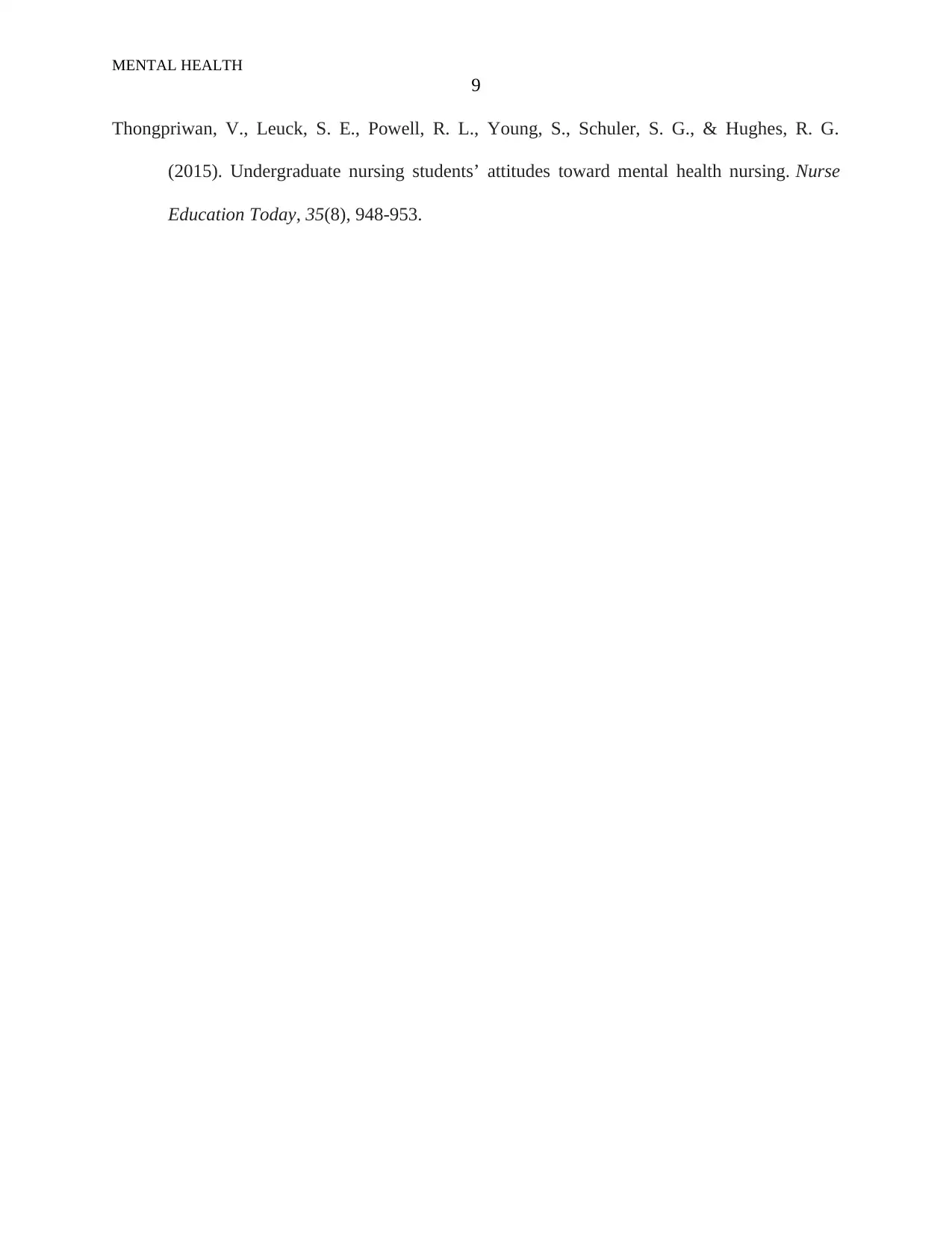
MENTAL HEALTH
9
Thongpriwan, V., Leuck, S. E., Powell, R. L., Young, S., Schuler, S. G., & Hughes, R. G.
(2015). Undergraduate nursing students’ attitudes toward mental health nursing. Nurse
Education Today, 35(8), 948-953.
9
Thongpriwan, V., Leuck, S. E., Powell, R. L., Young, S., Schuler, S. G., & Hughes, R. G.
(2015). Undergraduate nursing students’ attitudes toward mental health nursing. Nurse
Education Today, 35(8), 948-953.
⊘ This is a preview!⊘
Do you want full access?
Subscribe today to unlock all pages.

Trusted by 1+ million students worldwide
1 out of 9
Related Documents
Your All-in-One AI-Powered Toolkit for Academic Success.
+13062052269
info@desklib.com
Available 24*7 on WhatsApp / Email
![[object Object]](/_next/static/media/star-bottom.7253800d.svg)
Unlock your academic potential
Copyright © 2020–2025 A2Z Services. All Rights Reserved. Developed and managed by ZUCOL.





